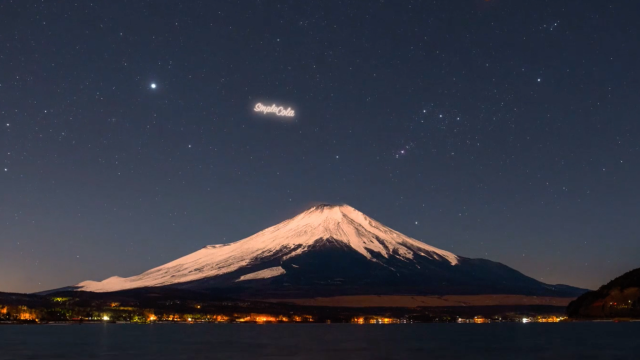If there is one thing no one needs, it’s additional spaces for brands to overwhelm humanity with even more advertising. But thanks to capitalism, the sky is evidently the limit.
One startup claims it will offer brands the chance to pollute our night skies with a system of teeny, reflective satellites used to replicate logos and messages of paying clients. Futurism reported Saturday that StartRocket, a company in Russia, found its first customer in PepsiCo. Per Futurism, the two partnered on a test launch to promote the energy drink Adrenaline Rush.
But contrary to Futurism’s report that Pepsi will “use an artificial constellation, hung in the night sky next to the stars, to promote an energy drink,” PepsiCo now says that outside of an “exploratory test,” this isn’t going to be an ongoing deal.
“We can confirm StartRocket performed an exploratory test for stratosphere advertisements using the Adrenaline GameChangers logo,” a PepsiCo spokesperson told Gizmodo in a statement by email. “This was a one-time event; we have no further plans to test or commercially use this technology at this time.”
StartRocket did not immediately return a request for comment.
StartRocket claims on its website that its web of reflective CubeSats could be used for advertising and information services as well as for governmental use during “catastrophical emergencies.” The startup says this system of satellites would orbit Earth from a distance of about 400-500 km and would display three to four messages per day. According to its own timeline, StartRocket is hoping to complete the first test launch of its so-called Orbital Display in 2021.
Sitnikov told NBC News in January that he was inspired to invent the “first media in orbit” after learning of the launch of the secret deployment of the Humanity Star last year. For the uninitiated, the Humanity Star is a glorified disco ball that was launched into low-Earth orbit by the private aerospace company Rocket Lab.
Initially intended to orbit Earth for up to nine months as some sort of narrative about humanity’s position in the universe, the thing fell back to Earth just two months after its launch.
For no reason at all, here’s what it looks like when a satellite goes through Hubble’s field of view whilst you are trying to image something in the distant solar system. pic.twitter.com/eLWR1ncdqx
— Alex Parker (@Alex_Parker) January 25, 2018
Also of note about the Humanity Star was its status as a nuisance to the science community and its interference with astronomers’ ability to study our night skies, as the Verge reported at the time of its demise. NBC News noted that projects like these that shoot more stuff into low Earth orbit also have the potential to contribute to an increasingly worrisome space junk problem.
There’s also the issue of whether regulatory powers will allow StartRocket or any other private company to start charging brands to launch shit into our skies whenever or however they choose to. Even if PepsiCo’s experimental campaign partnership turns out to be either a spectacular failure or some kind of viral marketing scheme — which god help us, is always a possibility — StartRocket isn’t the first company to dream up ads in space. It definitely won’t be the last.
[Futurism]
